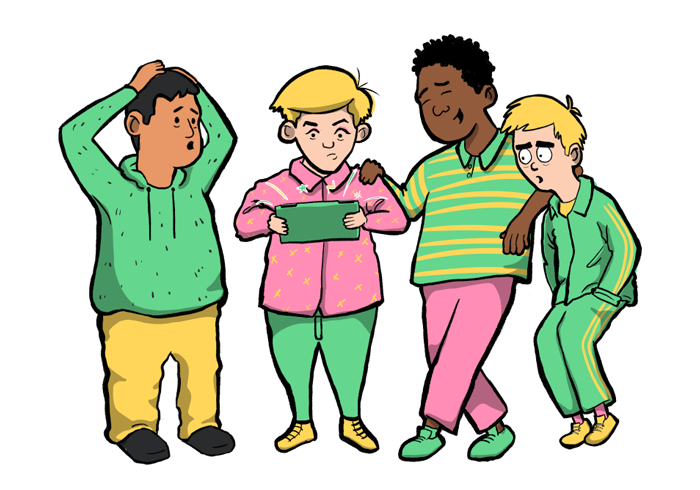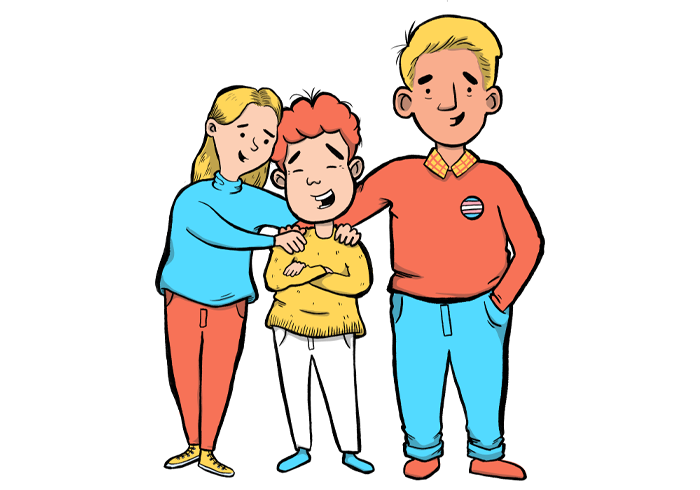Trans children and schools

Trans children now come out both younger and to a greater extent than before, and schools are constantly realizing that they are not prepared for it. On this web page, information on trans children has been compiled along with two types of checklists, one for schools where a child has recently come out as a trans or is about to start studying at the school, and the other for schools that want to become 'trans friendly' regardless of whether they have trans students. A gender support plan for trans students has also been created.
Checklists
The checklists are adapted for both the primary and preschool levels. They are available as PDF files. It's a good idea to view the content on this page when reviewing the checklists.

Support plan
A gender support plan has been created for primary schools with trans students. The support plan is based on foreign plans and is meant for trans students and students with atypical gender expression and school staff together with the students’ guardians. The plan covers many aspects with a view to obtaining a good overview of the student's status, how the school can support the student, and what practical aspects need to be considered. The idea is for the student, guardians, and school representatives to meet and review the plan together. It is best to hold the meeting as soon as possible so that appropriate support can be ensured.
Material useful for trans children, immediate family, and professionals
Here is a list of LGBT+ education material including books, articles, videos, and more, covering LGBT+ issues, including transgender child and adult issues. Each item has a brief description of the content as well as its language, as well as who it might be appropriate for. When using material for children, it is good to use it as a starting point for discussions.
You can also check out the 2021 Gender and LGBT+ Education Material Report, which groups content by school level.
Definitions and status of trans children
It is important to recognize the gender identity of transgender children and celebrate their gender expression and choice of name and pronoun, for example they/them, he/him, she/her etc. Education for those working with trans children as well as their immediate family is an important part of improving their well-being, but there is also a need to change the structure and organization of institutions such as schools and after-school programs.
School-based gender segregation and birthday groups
Dividing groups by sex can be exclusionary and create problems for transgender children, intersex children, and others who do not fit traditional stereotypes about gender and its expression. Sex-based grouping can also reinforce stereotypes about gender differences. It is therefore advisable to find other ways to divide groups to prevent exclusion and marginalization. Many schools and recreational programs have moved away from sex-based grouping, a longstanding practice in their activities, such as for birthday groups, sports, mom or dad groups for coffee, and other events. Good solutions can always be found that ensure that all genders and all families can participate. Below are guidelines and information on birthdays and birthday groups for schools that want to use alternatives to sex-based grouping, as this practice can exclude transgender and other children, and conflicts with the principles of equality laws and policies. Moving away from gender segregation does not mean ignoring the effects of the gender system; it still needs to be considered in all work.
Communities and support for trans people and immediate families
Trans Iceland is a support and activist organisation for trans people in Iceland. They have a website with a variety of information about trans people, including a brochure intended for media professionals on how best to cover trans people.
Trans Friends is an advocacy organization for parents and the immediate families of trans children and young people in Iceland. Their website has more about the organization and various information about trans children and young people.
Samtökin '78 maintains a support group for the immediate families of trans children and young people and provides free counseling for trans people and their families.
More information, education, and advice
The Human Rights Office provides education, support, and advice on LGBT+ issues and broader equality matters.
- You can contact the specialist in LGBT+ matters at the Office of Human Rights and Democracy through hinsegin@reykjavik.is
- The Gender Equality Academy provides support and advice, as well as education, on equality issues in both Reykjavík City schools and after-school programs. Contact the Gender Equality School at jafnrettisskolinn@reykjavik.is
- Samtökin '78 have an agreement with Reykjavík City and provide training to students on LGBT+ issues and people in Reykjavík City schools free of charge. Counseling is also available for LGBT+ children/people and their immediate families free of charge. You can sign up for education on the website of Samtökin '78
- Samtökin '78 and Tjörnin run an LGBT+ youth center for all young people aged 13 to 16 who identify as LGBT+ or have another connection with LGBT+ issues. The youth center is open every Tuesday evening from 7:30pm to 10pm. LGBT+ social activities are also available for 10-12 year olds. Hrefna Þórarinsdóttir is the director and she provides further information about their activities and opening hours. The director can be contacted via email hrefna.thorarinsdottir@rvkfri.is or phone at 6908904.
For more information or advice, you can contact hinsegin@reykjavik.is